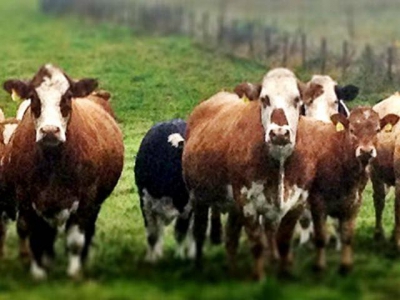Livestock chain analyses help predict disease spread

U.K. study demonstrates buying and selling cattle can link individual farms to thousands of others per purchase.
Livestock transportation chains are often very complex, and that complexity expands the larger the industry segment is, making understanding the contact chains difficult in larger nations such as the U.S.
However, understanding how these networks work helps identify potential transmission routes for infectious disease in livestock or even provide clarity to supply chains.
With the complexity of the U.S. livestock industry, it can sometimes be helpful to examine these livestock networks in other countries as a first step.
For example, a new study, led by veterinary researcher Helen Fielding from the University of Exeter in the U.K., has examined the extent to which British beef and dairy farms are connected through cattle movements.
The research could help identify potential pathways for the spread of important cattle infections that can cause major health, welfare and economic problems for the farming industry, Exeter said.

Study senior author Robbie McDonald said, "Currently, it is very difficult for farmers to see the whole history of the animals they buy and the status of the farms they are directly bought from. This research shows that even farms that buy their cattle very carefully might be exposed to infections from many other unknown farms across the whole country.
"Better understanding of the extensive connections formed by trading between British farms can help quantify the risks of disease spread and assist in the formulation of control strategies that work alongside efficient trading practices," McDonald said.
The Exeter researchers analyzed patterns of buying and selling cattle on British farms using official records of 75 million movements of cattle among farms from 2001 to 2015.
Starting with direct trades, when one farm buys from or sells cattle to another, the researchers traced "contact chains" that describe networks of farms linked by sequential movements of their cattle.
By looking at 12-month periods of trading, the study found that around half of all British cattle farms were connected to more than 1,000 other farms every year when they bought in cattle, the university reported, adding that 16% of farms were connected to more than 10,000 other farms in a single year.
When selling cattle, the contact chains were similarly extensive: Two thirds of farms were connected to more than 1,000 other farms, and 15% of farms again linked to more than 10,000 farms in a single year, the researchers said.
The study found that, on average, from 2001 to 2015, more than 13,000 British cattle farms had contact chains extending to more than 10,000 other farms by selling and more than 10,000 farms by buying in any single year.
These super-connected farms could potentially be particularly exposed to infections and particularly able to spread them, the researchers said.
"We found that farms, even if they only bought cattle from one or two other farms, could be at the end of a chain connecting their farm and their animals to several-thousand other farms," said Fielding, a veterinary researcher at the University of Exeter's Environment & Sustainability Institute.
"For example, one farm in Devon bought only six cattle in one year, those six cattle came from four farms, and those four farms were connected in two steps back to 10 others. Tracking back 12 months, the sequence of links to the one Devon farm extended to 11,132 farms as far afield as Kent, North Wales and Orkney," Fielding added.
Có thể bạn quan tâm
 Muddy pastures interfere with livestock grazing
Muddy pastures interfere with livestock grazing Compression from tires and ruts from cattle or horse traffic can permanently damage pastures, and heavy rainfall can worsen that damage.
 Genomics link beef cattle to production environment
Genomics link beef cattle to production environment Grant issued in 2015 starting to match cattle to specific environments in U.S.
 Supplementing diets for pastured-raised dairy cows may boost milk yields
Supplementing diets for pastured-raised dairy cows may boost milk yields A blended, yeast-based additive may improve dry matter intake and milk production for pasture-raised dairy cows facing heat stress conditions, say researchers.